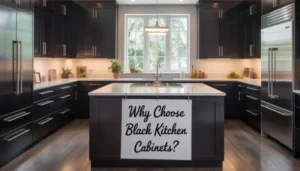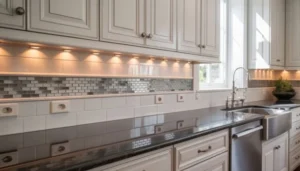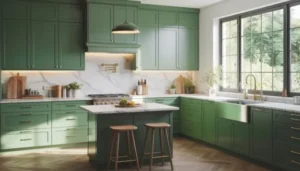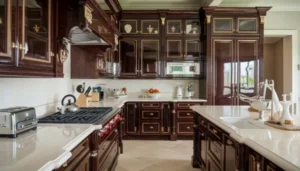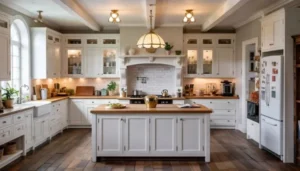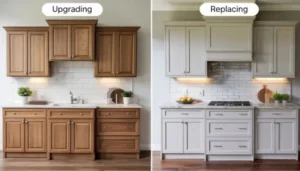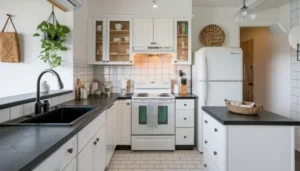How to clean kitchen counters isn’t just a question of hygiene, it’s a key part of maintaining a safe, beautiful, and functional cooking space. Clean counters help prevent bacteria buildup, eliminate odors, and preserve the quality of your countertop surfaces over time. Whether you’re dealing with stubborn stains or just need a daily routine, knowing the right methods makes all the difference.
At Poseidon Remodeling, we believe a well-maintained kitchen is the foundation of a happy home. As a trusted name in kitchen care and remodeling, we help homeowners not only create stunning kitchen spaces but also keep them looking their best for years to come. In this guide, we’ll walk you through everything you need to know about cleaning your kitchen counters the right way efficiently, safely, and based on your unique countertop material.
What is Your Countertop Material?

It’s important to know what kind of countertop you’re working with before diving into cleaning kitchen counters. The first step to keeping your worktops looking brand new is understanding the surface you have because different materials react differently to heat, moisture, and cleaning solutions.
Why It Matters
Using the wrong cleaner or method can dull, stain, or even damage your countertops over time. That’s why proper identification is more than just helpful, it’s essential.
Common Countertop Types & How to Clean Them
Here’s a quick breakdown of popular countertop surfaces and the best approach for each:
- Granite
- Clean with: Warm water, mild dish soap, and a soft cloth
- Avoid: Acidic cleaners (like vinegar or lemon)
- Tip: Reseal every 1–2 years for stain resistance
- Quartz
- Clean with: Gentle dish soap and water; microfiber cloth
- Avoid: Harsh chemicals and abrasive scrubbers
- Note: Doesn’t need sealing, but avoid prolonged heat exposure
- Marble
- Clean with: pH-neutral cleaner or a stone-safe product
- Avoid: Anything acidic it can etch the surface
Extra care: Wipe spills immediately to prevent permanent stains
- Laminate
- Clean with: All-purpose cleaner or diluted dish soap
- Avoid: Too much water at the seams and abrasive pads
- Budget-friendly, but still benefits from gentle care
- Butcher Block (Wood)
- Clean with: White vinegar or dish soap; sanitize with diluted bleach
- Avoid: Letting water sit wood can warp or crack
- Tip: Regularly oil the surface to keep it hydrated and safe
- Tile
- Clean with: Baking soda paste or gentle cleaner for grout and surface
- Avoid: Bleach on colored grout
- Maintenance: Sealing grout can help resist stains and mildew
Cleaning Compatibility 101
Not all surfaces can handle the same routine. When figuring out how to clean countertops, always check if your product is:
- pH-balanced for natural stone
- Non-abrasive for polished finishes
- Moisture-safe for porous materials like wood or unsealed stone
Poseidon Remodeling’s Pro Tip
At Poseidon Remodeling, we always advise clients to match their cleaning habits with their countertop material. This small change prevents long-term damage and extends the life of your investment. A high-end counter deserves the right care and knowing how to clean kitchen counters the correct way will save you from expensive repairs down the road.
Daily Cleaning Routine

A clean kitchen isn’t just about looks it’s about maintaining hygiene and preserving your countertop investment. Whether your counters are brand-new or part of a recent kitchen remodel, daily upkeep can make all the difference. Let’s break down a simple, effective routine that keeps your surfaces spotless without damaging them.
Step-by-Step: How to Clean Kitchen Counters Every Day
Keeping your counters clean doesn’t have to take more than a few minutes. Here’s an easy routine to follow:
- Clear the Surface
- Remove food scraps, dishes, and clutter. Give yourself a blank slate.
- Remove food scraps, dishes, and clutter. Give yourself a blank slate.
- Wipe Down with Warm Soapy Water
- Mix a few drops of mild dish soap with warm water.
Use a soft cloth or sponge to gently wipe the surface.
- Mix a few drops of mild dish soap with warm water.
- Rinse with Clean Water
- Go over the area with a clean, damp cloth to remove any soap residue.
- Go over the area with a clean, damp cloth to remove any soap residue.
- Dry with a Microfiber Towel
- Prevent water spots and streaks by drying thoroughly.
- Prevent water spots and streaks by drying thoroughly.
- Sanitize (If Needed)
- If you’ve been working with raw meat or sticky spills, use a food-safe sanitizer that’s compatible with your countertop type.
Best Tools & Cleaners for Daily Use
Use soft chemicals and non-abrasive instruments whenever possible to clean kitchen counters safely. The experts at Poseidon Remodelling suggest the following:
- Microfiber cloths – gentle, effective, and reusable
- Soft sponges – perfect for everyday messes
- Dish soap – safe for nearly all countertop materials
- Stone-safe sprays – if you have granite, marble, or quartz
- Spray bottle with vinegar & water – ideal for laminate and tile (avoid on natural stone)
Poseidon Remodeling’s Pro Tip: Always run a spot test before using a new cleaning, especially if your counters were just remodelled. Even moderate solutions can cause unexpected reactions on some surfaces.
Time-Saving Cleaning Hacks
Life gets busy, so here are a few insider tips to keep things efficient:
- Keep a spray bottle on hand for quick cleanups after cooking
- Wipe spills immediately—the longer they sit, the harder they are to remove
- Set a 2-minute daily timer—make it a quick habit after dinner
- Use cutting boards & trivets to reduce mess in the first place
Staying consistent with your daily routine ensures you won’t have to deep clean as often and it keeps your space guest-ready at all times. If your surfaces are showing wear despite your efforts, it might be time to consider a full kitchen remodel with help from the professionals at Poseidon Remodeling.
How to Clean Common Stains on Kitchen Counters

When life gets hectic, stains can still find their way onto your surfaces even with a healthy daily routine. Daily upkeep is crucial, but so is knowing how to clean kitchen counters and worktops after stains appear. The key? Understand the type of stain you’re using, the nature of your surface, and the best technique for the job.
Let’s break down the most common kitchen stains and how to remove them safely without damaging even the best kitchen countertop materials.
Grease Stains
Grease loves to cling to counters, especially near stovetops.
How to tackle it:
- Mix warm water with a few drops of dish soap (degreasing types work best).
- Use a soft sponge to gently scrub the area in circular motions.
- Wipe clean with water and dry with a microfiber cloth.
Pro tip: On porous surfaces like granite or marble, blot—don’t rub. You don’t want to push the grease deeper into the stone.
Coffee, Wine, and Food Dye Spills
These are colorful and quick to stain if left unattended especially on lighter countertops.
How to remove:
- Create a paste using baking soda and water.
- Gently apply it to the stain and let it sit for 5–10 minutes.
- Wipe it away with a damp cloth and dry.
For tougher stains:
- Use hydrogen peroxide (only on light-colored, non-porous surfaces).
- Always test on a small area first to avoid discoloration.
Water Spots and Mineral Buildup
Common on quartz, tile, and around sinks, hard water spots can dull the look of your clean counters.
Cleaning steps:
- Spray a 1:1 mix of white vinegar and water (not for marble or granite!).
- Let it sit for a minute, then wipe with a soft cloth.
- For natural stone, use a pH-neutral stone cleaner instead.
Stain Removal by Countertop Type
The way you remove stains should match your surface. Here’s a quick guide:
- Granite & Marble – Use baking soda or a stone-safe poultice; avoid acids.
- Quartz – Mild soap and water; avoid bleach and heavy-duty chemicals.
- Laminate – Baking soda paste works well, but don’t let it sit too long.
- Butcher Block – Scrub gently with lemon and salt; sanitize with vinegar.
- Tile – Focus on grout too; use a toothbrush with baking soda for deeper stains.
Natural vs. Chemical Cleaners: What Works Best?
You may be wondering whether natural alternatives are as effective as store-bought ones when it comes to cleaning kitchen counters.
- Natural cleaners (like baking soda, vinegar, and lemon) are great for everyday cleaning and lighter stains.
- Chemical cleaners are more effective for deep or set-in stains but need to be surface-safe especially on high-end finishes.
If you’ve invested in one of the best kitchen countertop materials, such as quartz or natural stone, always read the label before using any commercial cleaner.
When stains keep returning or your counters start to lose their shine, it might be time to upgrade. Choosing the best kitchen countertop materials and maintaining them properly can transform your space and if you need guidance, Poseidon Remodeling is here to help you choose surfaces that are beautiful and easy to keep clean.
Sealing Your Countertops
When learning how to clean kitchen counters, many people forget one important step: sealing. Especially if your countertops are made of natural stone, sealing can make a huge difference in how well your surfaces resist stains and moisture. Whether your counters are part of a recent home addition or an older kitchen setup, sealing also makes cleaning kitchen counters quicker and more effective.
Why Sealing Matters
Marble and granite are examples of natural stones that are permeable. This implies that if the material isn’t covered, liquids and oils may seep in and cause stains. Water droplets or everyday culinary spills can result in permanent discolouration.
You may be exerting more effort than required to keep your countertops clean if they are not properly sealed. You have a better chance of cleaning up spills before they become permanent when the surface is sealed.
Common Countertops That Need Sealing
Here are some of the most common surfaces that benefit from regular sealing:
Granite
Marble
Limestone
Slate
Concrete
Soapstone
Engineered materials like quartz usually don’t require sealing, but it’s still important to follow the manufacturer’s care recommendations.
How Often Should You Seal Your Countertops
The frequency of sealing depends on the material and how much use your kitchen gets. Here’s a general guideline:
Granite – Seal every one to two years
Marble – Seal at least once a year
Concrete or Soapstone – Seal every few months
Quartz – Usually doesn’t need sealing
A quick way to test if your counters need sealing is to drop a small amount of water on the surface. If the water gets absorbed and darkens the countertop within a few minutes, it’s time to reseal.
Avoid These Cleaning Mistakes
How to clean kitchen counters, knowing what not to do is just as important as using the right techniques. Even if you’ve been cleaning your kitchen counters for years, a few common mistakes can cause permanent damage. Let’s break down the most frequent errors and how to avoid them.
Using the Wrong Cleaners
One of the biggest mistakes people make when cleaning kitchen counters is using harsh cleaners that damage the surface.
- Vinegar or bleach on natural stone surfaces like marble, granite, and quartz can cause etching, discoloration, or even surface degradation.
- Acidic cleaners (such as lemon or vinegar) should never be used on marble or granite, as they can break down the protective sealant and stain the stone.
Solution: Always choose a cleaner specifically designed for your countertop material. For natural stones, a pH-neutral cleaner or stone-safe solution is your best bet.
Over-Scrubbing or Using Abrasive Tools
Sometimes, when a stain won’t budge, it’s tempting to scrub harder or use a rough scrub brush. However, this can scratch or damage your countertops, especially if they’re made of softer materials like marble, quartz, or laminate.
Solution: Instead of using harsh tools, opt for soft sponges, microfiber cloths, or non-abrasive scrubbers. For tough stains, use a paste of baking soda and water or a product that’s safe for your specific material.
Skipping Daily Cleaning Routines
Skipping daily maintenance might seem harmless, but over time, food residue, oils, and spills can build up. This makes it harder to clean and can lead to permanent stains or damage.
Solution: Make cleaning part of your daily routine. Even a quick wipe-down with mild dish soap and warm water will prevent grime buildup and keep your counters looking fresh.
Ignoring Sealing Schedules
If your countertops are made from porous materials like granite, marble, or stone, sealing is essential. Failing to reseal your surfaces regularly can leave them vulnerable to stains and damage from spills, heat, or moisture.
Solution: Stick to a sealing schedule based on your countertop type. If you’re not sure when to reseal, consult with a professional especially if you’ve recently done a whole home remodeling project. Proper sealing ensures longevity and protects your investment.
Costly Damage That Can Be Avoided with the Right Knowledge
Even with the best intentions, improper cleaning methods can result in costly repairs. Scratching, staining, or weakening the surface can be expensive to fix, and some damage might be irreversible. By understanding how to clean kitchen counters properly, you can avoid these costly mistakes and enjoy your countertops for years to come.
If you’re ever unsure about the right techniques or cleaning products, it’s always a good idea to reach out to experts. Whether you’ve remodeled your kitchen as part of a whole home remodeling project or are just looking to maintain your existing counters, a little knowledge goes a long way in keeping your surfaces in top shape.
Why Choose Poseidon Remodeling For Your Kitchen Remodel
Investing in a kitchen remodel is a big decision, and it’s not just about aesthetic appeal it’s also about making sure your kitchen is both functional and easy to maintain. How to clean kitchen counters plays a crucial role in your remodel, and this is where Poseidon Remodeling stands out. We understand the connection between a beautiful kitchen and a low-maintenance, long-lasting design. With our expert knowledge and approach, we ensure that your new counters are not only stunning but also easy to keep clean.
The Connection Between Proper Cleaning and Remodeling Investments
When planning a kitchen remodel, it’s essential to think about more than just looks. You’re making a significant investment, and you want to ensure that your countertops will stand the test of time not only in terms of durability but also ease of upkeep. We understand that cleaning kitchen counters shouldn’t become a daily struggle.
At Poseidon Remodeling, we specialize in selecting the right materials that match your design vision while ensuring they are easy to maintain. We help you choose countertops that are both beautiful and practical, so you can enjoy your kitchen without worrying about stains, scratches, or daily cleaning frustrations.
Poseidon’s Approach to Designing Low-Maintenance, Beautiful Kitchen Counters
With years of experience in kitchen remodeling, Poseidon Remodeling knows that the best kitchen counters are those that combine both style and functionality. Here’s how we approach designing your perfect space:
- Low-Maintenance Materials: We work with you to choose the best countertop materials that fit your lifestyle and design preferences. From quartz to granite, we prioritize surfaces that are easy to clean and maintain.
- Long-Term Durability: Our team ensures that your countertops are not just a beautiful focal point but also resilient to wear and tear. We select materials that withstand heat, stains, and spills, making cleaning kitchen counters a breeze.
- Custom Designs: Whether you prefer a sleek modern look or a more traditional style, we customize your design to meet your aesthetic goals while considering the practical aspects of kitchen upkeep.
Benefits of choosing Poseidon Remodeling:
- Expert Knowledge: We understand the best materials for ease of maintenance and longevity.
- Customized Solutions: We customize your kitchen remodel to suit your needs and design preferences.
- High-Quality Results: We deliver top-notch craftsmanship, ensuring your remodel lasts for years to come.
Get a Free Consultation for Your Dream Kitchen
Ready to make your dream kitchen a reality? Whether you’re renovating a small space or embarking on a full-scale kitchen remodel, Poseidon Remodeling is here to help. We’ll guide you through every step, from choosing the right materials to ensuring your kitchen is easy to maintain.
Contact us today for a free consultation and take the first step toward creating a kitchen that’s both beautiful and easy to care for. Let’s design your perfect space together!
Final Thought
How to clean kitchen counters is all about consistency and using the right techniques for your specific countertop material. Regular cleaning with the proper tools and products ensures your surfaces stay beautiful and durable. Avoiding common mistakes like using harsh cleaners or neglecting sealing can prevent unnecessary damage and save you time and money. By sticking to a daily cleaning routine, your kitchen counters will stay pristine and easy to maintain.
For those considering a kitchen remodel, Poseidon Remodeling is your trusted partner in creating spaces that are both beautiful and functional. We specialize in designing kitchens that not only look amazing but are also easy to care for. Contact Poseidon Remodeling today for a free consultation and let us help you transform your kitchen into a stunning, low-maintenance space!
FAQs
What is the best way to clean kitchen counters?
The best way to clean kitchen counters depends on the material of your countertop. For most surfaces, a simple solution of warm water and mild dish soap is effective. For tougher stains, use a cleaner designed for your specific countertop material, such as granite cleaner for granite countertops or a pH-neutral cleaner for marble. Always avoid harsh chemicals like bleach or vinegar, especially on natural stone surfaces.
How do I clean granite countertops without damaging them?
To clean granite countertops, use a gentle, pH-neutral cleaner or a mild dish soap solution. Avoid acidic cleaners like vinegar or lemon juice, as they can damage the stone. Wipe the surface with a soft cloth or microfiber towel to prevent scratching, and be sure to reseal your granite countertops regularly to maintain their durability.
Can I use bleach to clean my kitchen counters?
While bleach is an effective disinfectant, it should not be used on natural stone countertops like granite or marble, as it can cause discoloration and damage the surface. For most kitchen counters, opt for mild, non-abrasive cleaners to ensure your counters remain in great condition. Always follow the manufacturer’s guidelines for cleaning to avoid any damage.
How often should I clean my kitchen counters?
You should clean kitchen counters daily to remove food particles, stains, and spills before they set in. Regular cleaning not only keeps your kitchen hygienic but also prevents stains from becoming permanent. If you have natural stone countertops, be sure to follow a weekly or monthly cleaning routine with appropriate products to maintain their shine and durability.
Do I need to seal my kitchen countertops?
Sealing your kitchen countertops is essential for protecting surfaces like granite, marble, and concrete from stains and moisture. How often you need to reseal depends on the material, but most natural stone countertops require resealing every 1 to 2 years. Regular sealing will make cleaning kitchen counters easier and help prevent long-term damage.


